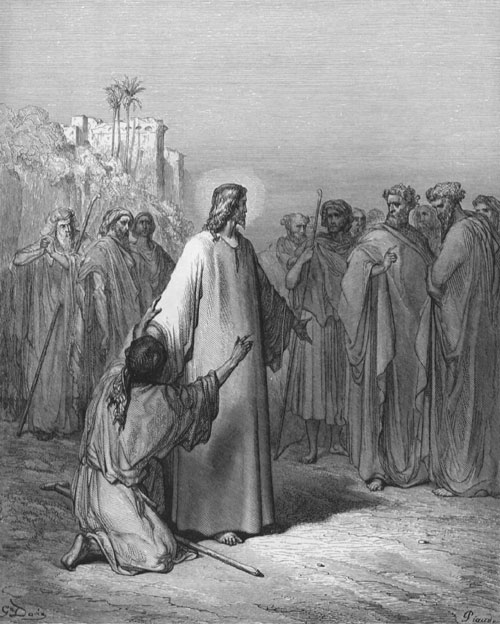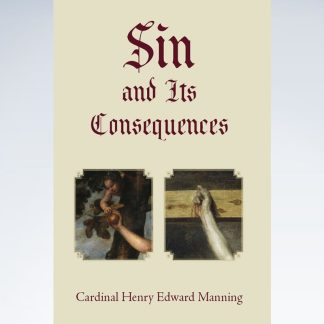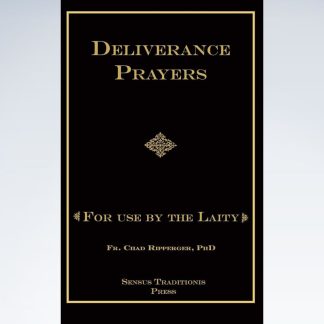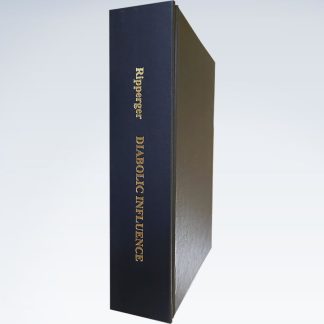

Fr. Leonard Goffine on the Third Sunday in Lent
This Sunday can also be called Oculi Sunday.The Introit of this day’s Mass, which begins with the word Oculi, is the prayer of a soul imploring deliverance from the snares of the devil:
The great battle with the enemy of mankind is now fiercely raging: the Church beseeches her God to stretch forth his right hand in her defence. Such is the petition she makes in to-day’s Collect.
INTROIT:
| Oculi mei semper ad Dominum, quia ipse evellet de laqueo pedes meos: respice in me, et miserere mei; quoniam unicus et pauper sum ego. Ps. Ad te, Domine, levavi animam meam: Deus meus, in te confido, non erubescam. V. Gloria Patri. Oculi. | My eyes turn ever towards the Lord, for he shall pluck my feet out of the snare: look thou upon me, and have mercy on me, for I am alone and poor. Ps. To thee, O Lord, have I lifted up my soul; in thee, O my God, I put my trust, let me not be ashamed. V. Glory, &c. My eyes. |
COLLECT: We beseech Thee, Almighty God, regard the desires of the humble, and stretch forth the right hand of Thy majesty to be our defence. Through Jesus Christ, our Lord, etc.
EPISTLE: (Ephes. V. 1-9.) Brethren, be ye followers of God, as most dear children; and walk in love, as Christ also hath loved us, and hath delivered himself for us, an oblation and a sacrifice to God, for an odor of sweetness. But fornication, and all uncleanness, or covetousness, let it not so much as be named among you, as becometh saints; nor obscenity, nor foolish talking, nor scurrility, which is to no purpose; but rather giving of thanks: for know ye this, and understand, that no fornicator, nor unclean, nor covetous person, which is a serving of idols, hath any inheritance in the kingdom of Christ and of God. Let no man deceive you with vain words; for because of these things cometh the anger of God upon the children of unbelief. Be ye not therefore partakers with them. For you were heretofore darkness; but now light in the Lord. Walk, then, as children of the light: for the fruit of the light is in all goodness, and justice, and truth.
EXPLANATION: The apostle requires us to imitate God, as good children imitate their father in well-doing and in well-wishing; besides he declares that all covetousness, fornication, all disgraceful talk and equivocal jokes should be banished from Christian meetings, even that such things should not be so much as mentioned among us; because these vices unfailingly deprive us of heaven. He admonishes us not to let ourselves be deceived by the seducing words of those who seek to make these vices appear small, nothing more than pardonable human weaknesses; those who speak thus are the children of darkness and of the devil, they bring down the wrath of God upon themselves, and all who assent to their words. A Christian, a child of light, that is, of faith, should regard as a sin that which faith and conscience tell him is such, and must live according to their precepts and not by false judgment of the wicked. Should any one seek to lead you away, ask yourself, my Christian soul, whether you would dare appear with such a deed before the judgment-seat of God. Listen to the voice of your conscience, and let it decide, whether that which you are expected to do is good or bad, lawful or unlawful.
ASPIRATION: Place Thy fear, O God, before my mouth, that I may utter no vain, careless, much less improper and scandalous words, which may be the occasion of sin to my neighbor. Strengthen me, that I may not be deceived by flattering words, and become faithless to Thee.
GOSPEL: (Luke XI. 14.-28.) At that time, Jesus was casting out a devil, and the same was dumb. And when he had cast out the devil, the dumb spoke, and the multitudes were in admiration at it. But some of them said: He casteth out devils by Beelzebub the prince of devils. And others tempting, asked of him a sign from heaven. But he seeing their thoughts, said to them: Every kingdom divided against itself shall be brought to desolation, and house upon house shall fall. And if Satan also be divided against himself, how shall his kingdom stand? because you say, that through Beelzebub I cast out devils. Now if I cast out devils by Beelzebub, by whom do your children cast them out? Therefore they shall be your judges. But if I by the finger of God cast out devils, doubtless the kingdom of God is come upon you. When a strong man armed keepeth his court, those things which he possesseth are in peace; but if a stronger than he come upon him, and overcome him, he will take away all his armor wherein he trusted, and will distribute his spoils. He that is not with me, is against me; and he that gathereth not with me, scattereth. When the unclean spirit is gone out of a man, he walketh through places without water, seeking rest; and not finding, he saith, I will return into my house whence I came out: and when he is come, he findeth it swept and garnished. Then he goeth, and taketh with him seven other spirits more wicked than himself, and entering in they dwell there. And the last state of that man becomes worse than the first. And it came to pass, as he spoke these things, a certain woman from the crowd, lifting up her voice, said to him: Blessed is the womb that bore thee, and the paps that gave thee suck. But he said: Yea rather blessed are they who hear the word of God, and keep it.
Can a man be really possessed of a devil?
It is the doctrine of the Catholic Church that the evil spirit most perniciously influences man in a twofold manner: by enticing his soul to sin, and then influencing his body which he often entirely or partially possesses, manifesting himself by madness, convulsions, insanity, etc. Many texts of Scripture, and the writings of the Fathers speak of this possession. St. Cyprian writes: “We can expel the swarms of impure spirits, who for the ruin of the soul, enter into the bodies of men, and we can compel them to acknowledge their presence, by the force of powerful words.” Possession takes place by the permission of God either for trial or as a punishment for sin committed, (I. Cor. V. 5.) and the Church from her Head, Jesus, who expelled so many devils, has received the power of casting them out as He did. (Mark XVI. 17.; Acts V. 16., VIII. 6. 7., XVI. 18. &c.) She however warns her ministers, the priests, who by their ordination have received the power to expel the evil spirits, to distinguish carefully between possession and natural sickness, that they may not be deceived, (Rit. ROM. §. 3. §. 5-10.) and the faithful should guard against looking upon every unusual, unhealthy appearance as an influence of Satan, and should give no ear to impostors, but in order not to be deceived, should turn to an experienced physician or to their pastor.
What is understood by a dumb devil?
The literal meaning of this is the evil enemy, who some times so torments those whom he possesses that they lose the power of speech; in a spiritual sense, we may understand it to mean the shame which the devil takes away from the sinner, when he commits the sin, but gives back again, as false shame, before confession, so that the sinner conceals the sin, and thereby falls deeper.
How does Christ still cast out dumb devils?
By His grace with which He inwardly enlightens the sinner, so that he becomes keenly aware that the sins which he has concealed in confession, will one day be known to the whole world, and thus encourages him to overcome his false shame. – “Be not ashamed to confess to one man,” says St. Augustine, “that which you were not ashamed to do with one, perhaps, with many.” Consider these words of the same saint: “Sincere confession subdues vice, conquers the evil one, shuts the door of hell, and opens the gates of paradise.”
How did Christ prove, that He did not cast out devils by Beelzebub?
By showing that the kingdom of Satan could not stand, if one evil spirit were cast out by another; that they thus reproached their own sons who also cast out devils, and had not been accused of doing so by power from Beelzebub; by His own life and works which were in direct opposition to the devil, and by which the devil’s works were destroyed. – There is no better defence against calumny than an innocent life, and those who are slandered, find no better consolation than the thought of Christ who, notwithstanding His sanctity and His miracles, was not secure against calumniation.
What is meant by the finger of God?
The power of God, by which Christ expelled the evil spirits, proved himself God, and the promised Redeemer.
Who is the strong man armed?
The evil one is so called, because he still retains the power and intellect of the angels, and, practiced by long experience, seeks in different ways to injure man if God permits.
How is the devil armed?
With the evil desires of men, with the perishable riches, honors, and pleasures of this world, with which he entices us to evil, deceives us, and casts us into eternal fire.
Who is the stronger one who took away the devil’s armor?
Christ the Lord who came into this world that He might destroy the works and the kingdom of the devil, to expel the prince of darkness, (John XII. 31.) and to redeem us. from his power. “The devil,” says St. Anthony, “is like a dragon caught by the Lord with the fishing-hook of the cross, tied with a halter like a beast of burden, chained like a fugitive slave, and his lips pierced through with a ring, so that he may not devour any of the faithful. Now he sighs, like a miserable sparrow, caught by Christ and turned to derision, and thrown under the feet of the Christians. He who flattered himself that he would possess the whole orbit of the earth, behold, he has to yield!”
Why does Christ say: He who is not with me, is against me?
These words were intended in the first place for the Pharisees who did not acknowledge Christ as the Messiah, would not fight with Him against Satan’s power, but rather held the people back from reaching unity of faith and love of Christ. Like the Pharisees, all heretical teachers who, by their false doctrines, draw the faithful from communion with Christ and His Church, are similar to the devil, the father of heresy and lies. May all those, therefore, who think they can serve Christ and the world at the same time, consider that between truth and falsehood, between Christ and the world, there is no middle path; that Christ requires decision, either with Him, or against Him , either eternal happiness with Him, or without Him, everlasting misery.
Who are understood by the dry places through which the evil spirit wanders and finds no rest?
“The dry places without water,” says St. Gregory, “are the hearts of the just, who by the force of penance have drained the dampness of carnal desires.” In such places the evil -one indeed finds no rest, because there his malice finds no sympathy, and his wicked will no satisfaction.
Why does the evil spirit say: I will return into my house?
Because he is only contented there where he is welcomed and received: those who have purified their heart by confession, and driven Satan from it, but labor not to amend, again lose the grace of the Sacraments by sin, and thus void of virtue and grace, offer a beautiful and pleasant dwelling to the devil.
Why is it said: The last state becomes worse than the first?
Because a relapse generally draws more sins with it, and so it is said: the devil will return with seven other spirits more wicked than himself, by which may be understood the seven deadly sins, because after a relapse into sin conversion to God becomes more difficult, as a repeated return of the same sickness makes it harder to regain health; because by repetition sin easily becomes a habit and renders conversion almost impossible; because repeated relapses are followed by blindness of intellect, hardness of heart, and in the end eternal damnation.
Why did the woman lift up her voice?
This was by the inspiration of the Holy Ghost to shame the Pharisees who, blinded by pride, neither professed nor acknowledged the divinity of Christ, whilst this humble woman not only confessed Jesus as God, but praised her who carried Him, whom heaven and earth cannot contain. Consider the great dignity of the Blessed Virgin, Mother of the Son of God, and hear her praises from the holy Fathers. St. Cyril thus salutes her: “Praise to thee, Blessed Mother of God: for thou art virginity itself, the sceptre of the true faith!” and St. Chrysostom: “Hail, O Mother, the throne, the glory, the heaven of the Church!” St. Ephrem: “Hail, only hope of the Fathers, herald of the apostles, glory of the martyrs, joy of the saints, and crown of the virgins, because of thy vast glory, and inaccessible light!”
Why did Christ call those happy who hear the word of God and keep it?
Because, as has been already said, it is not enough for salvation to hear the word of God, but it must also be practiced. Because Mary, the tender Mother of Jesus, did this most perfectly, Christ terms her more happy in it, than in having conceived, borne, and nursed Him.
SUPPLICATION: O Lord Jesus! true Light of the world, enlighten the eyes of my soul, that I may never be induced by the evil one to conceal a sin, through false shame, in the confessional, that on the day of general judgment my sibs may not be published to the whole world. Strengthen me, O Jesus, that I may resist the arms of the devil by a penitent life, and especially by scorning the fear of man and worldly considerations, and guard against lapsing into sin, that I may not be lost, but through Thy merits maybe delivered from, all dangers and obtain heaven.

-
 1962 Roman Catholic Daily MissalUS$ 72.00
1962 Roman Catholic Daily MissalUS$ 72.00 -
 Sin and Its Consequences by Cardinal ManningUS$ 19.00
Sin and Its Consequences by Cardinal ManningUS$ 19.00 -
 Deliverance Prayers: For Use by the LaityUS$ 19.00
Deliverance Prayers: For Use by the LaityUS$ 19.00 -
 The Nature and Psychology of Diabolic InfluenceUS$ 87.00
The Nature and Psychology of Diabolic InfluenceUS$ 87.00 -
 Dominion: The Nature of Diabolic WarfareUS$ 59.00
Dominion: The Nature of Diabolic WarfareUS$ 59.00 -
 My God and My All Prayerbook by Father LasanceUS$ 21.00
My God and My All Prayerbook by Father LasanceUS$ 21.00
VIRGÓ SACRÁTA is a Christian mission-driven online resource and shop inspired from the beauty of Catholic faith, tradition, and arts. Our mission is to “Restore All Things to Christ!”, in continuing the legacy of Pope St. Pius X under the patronage of the Blessed Virgin Mary. “Who is she that cometh forth as the morning rising, fair as the moon, bright as the sun, terrible as an army set in battle array?” O Mary, conceived without sin, pray for us who have recourse to Thee.


